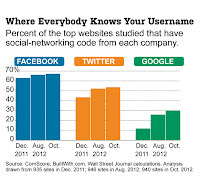Companies know more about your browsing habits & emails.

If you’ve shopped for a car online on Cars.com or other automotive websites recently, there’s a good chance Dataium LLC was watching most of your mouse-clicks.
Dataium LLC, the company that can track car shoppers like Mr. Morar. Dataium said that shoppers' Web browsing is still anonymous, even though it can be tied to their names. The reason: Dataium does not give dealers click-by-click details of people's Web surfing history but rather an analysis of their interests.
The use of real identities across the Web is going mainstream at a rapid clip. A Wall Street Journal examination of nearly 1,000 top websites found that 75% now include code from social networks, such as Facebook's FB +1.87% "Like" or Twitter's "Tweet" buttons. Such code can match people's identities with their Web-browsing activities on an unprecedented scale and can even track a user's arrival on a page if the button is never clicked. Dataium, says 10,000 automotive websites use its code.
The Wall Street Journal observed Dataium logging information about a visitors’ nearly every action — not just what pages were viewed, but also what parts of the page were clicked, which dropdown options were selected, and what information (such as name, email address, and phone number) were entered in dealer-contact forms.
The Journal’s tests indicated that Dataium does not collect Social Security numbers and credit card numbers, even if users enter them on a dealer-contact form.
As recently as late 2010, when the Journal wrote about Rapleaf Inc., a trailblazing company that had devised a way to track people online by email address, the practice was almost unheard-of. Today, companies like Dataium are taking the techniques to a new level.
Rapleaf's website claims it has "Real-Time Data on 80% of U.S. Emails."
"Instantly get data such as age, gender, and more. Upload a file in any of these supported formats: .xls, .xlsx, .txt, .csv, with any number of email addresses."
Click-tracking is common among analytics programs, says Jules Polonetsky, director of the Future of Privacy Forum. Many companies use such tracking to see, for example, how well new page-layouts perform. But some techniques may overstep visitors’ expectations of privacy, Polonetsky says. “The question is, are you reaching further than I can reasonably imagine?”
The Journal also saw on several occasions that Dataium software used a controversial technique to attempt to determine whether a visitor had been to nearly 100 other sites, including edmunds.com, bmw.com, usatoday.com, google.com, and linkedin.com.
Known as “CSS history sniffing”, this technique exploits a security vulnerability in older Web browsers, such as Internet Explorer 8. Modern browsers have plugged this privacy hole. Dataium CEO Eric Brown told the Journal it has used the technique intermittently for testing.
http://blogs.wsj.com/digits/2012/12/07/how-dataium-watches-you/
http://online.wsj.com/article/SB10001424127887324784404578143144132736214.html
Interactive: Which websites are sharing your personal details?
To identify what personal information gets passed to other companies when you log in to popular websites, The Wall Street Journal tested 50 of the top sites (by U.S. traffic) that offer registration, excluding sites that required a real-world account, such as banking sites. The Journal also tested 20 selected other sites that focus on sensitive subjects such as dating, politics, health, or children’s issues, and our own site, WSJ.com. Click here to read more about the methodology. Results for each site are below. Sites are ranked by popularity, based on comScore's numbers.
http://online.wsj.com/article/SB10001424127887324640104578165651354042798.html


